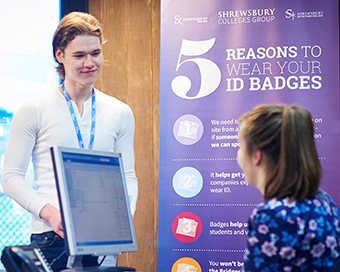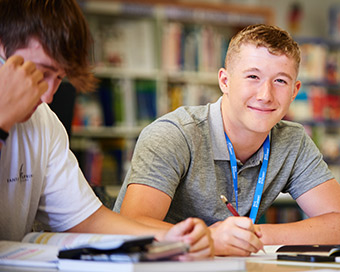A 16-year-old college student and entrepreneur from Shrewsbury, has harnessed the power of social media to answer the call for PPE for the NHS and has started production himself

Luke Thomas, from Shrewsbury, is studying Chemistry, Maths and Physics A Levels at Shrewsbury Colleges Group.
Entrepreneurial Luke, said that as the coronavirus pandemic spread across the country, his thoughts turned from making money to helping save lives.
Using equipment from his own business at home, Luke has, to date, produced 1500 S clips for the local NHS hospitals.
“As the pandemic scaled across the nation very quickly, I wanted to give everything I had to help people, especially those on the front line who will do anything for anyone else,” said Luke.
“So, alongside my continued college studies, I have devoted my time to giving something back to those that put their lives on the line, while hopefully improving their future.”
Luke discovered the multiple uses for laser cutting equipment in his final years at Meole Brace School, where he studied D&T.
In order to purchase his own machine, he bought, repaired and sold non-running motorbikes to turn over a profit.
“This profit allowed me to save up enough money to buy a ManTech 600x900 CO₂ Laser Cutter,” said Luke.
“With this machine, I established my company ‘Atomic Verge’ a Laser Cutting & Engraving company. It supplies personalised goods to a variety of clients.”
At the outset, Luke said he had no idea what PPE was needed, so he researched the problem to find out.
“When I first get faced with a problem, I always think big and begin thinking of some kind of massive invention I can design to help.
“However, I have discovered it’s not always the big ideas that make a difference. Sometimes less is more.
“I had no idea before I started what I could do because the aim wasn’t to produce a product to pitch to an audience.
“In this instance, I had to listen carefully to those affected and research different approaches to find what would make the most difference for them.”
Luke discovered he could help by producing acrylic ‘S clips’, used in conjunction with traditional disposable face masks, with elasticated straps which usually attach the masks over the user’s ears.
Luke said: “The traditional design causes absolute agony when the masks are worn for prolonged periods of time, just as NHS workers are facing now.
“The S clip is a simple design that sits on the rear of the head. The elasticated straps which usually sit behind the ears can be pulled behind the head connecting onto the clip. The S clips do the job of holding the straps in place, instead of the user’s ears, therefore saving the wearer a great deal of pain The acrylic material is wipeable and non-porous so suitable for use in a hospital environment.”
Luke was supplied with plenty of material from Shrewsbury Colleges Group to create his clips at home. He also received a kind donation from employees of Technology Supplies, a local supplier he uses.
So far, over 1500 units have already been taken to hospitals since Luke began production a 2 weeks ago.
“I am awaiting confirmation of requirements and feedback from the hospital to see if they need any more or if they can be improved in any way. If there is demand, I will continue to make them,” said Luke.
“Through other contacts, I have since contacted the Robert Jones and Agnes Hunt Orthopaedic Hospital in Oswestry and Ludlow Hospital to see if there is a demand for them there too.”
After successfully making the clips, Luke joined forces with Charlotte Brock, Programme Leader for Art & Design at SCG, and the duo are now looking to see if they should change focus and work on the production of facemasks.
“With the power of social media today, I was able to quickly come into contact with people all over the country/world who are doing their bit to support health organisations such as the NHS,” said Luke.
“Since starting my S clip production, I saw the production of PPE visors being advertised on social media and wanted to get further involved.
“I relayed this back to Charlotte and local supply companies in order to get prototypes created. As and when I hear that these are needed by the NHS, I’ll be ready to start production.
“Although I am still unsure of my final career aspirations, at this time, I hope to become a Chemical Engineer, and this experience of helping the NHS links in very closely with engineering and has definitely made me consider other career options.
“I thrive off being able to use technology and engineering to make a difference to people. While it is very hard to balance my educational studies and run a company simultaneously, I plan to not let anything stop me from progressing both.
“It really is fantastic to see so many people pulling together to give back what we can to those that are helping us, especially in such uncertain times,” he added.






